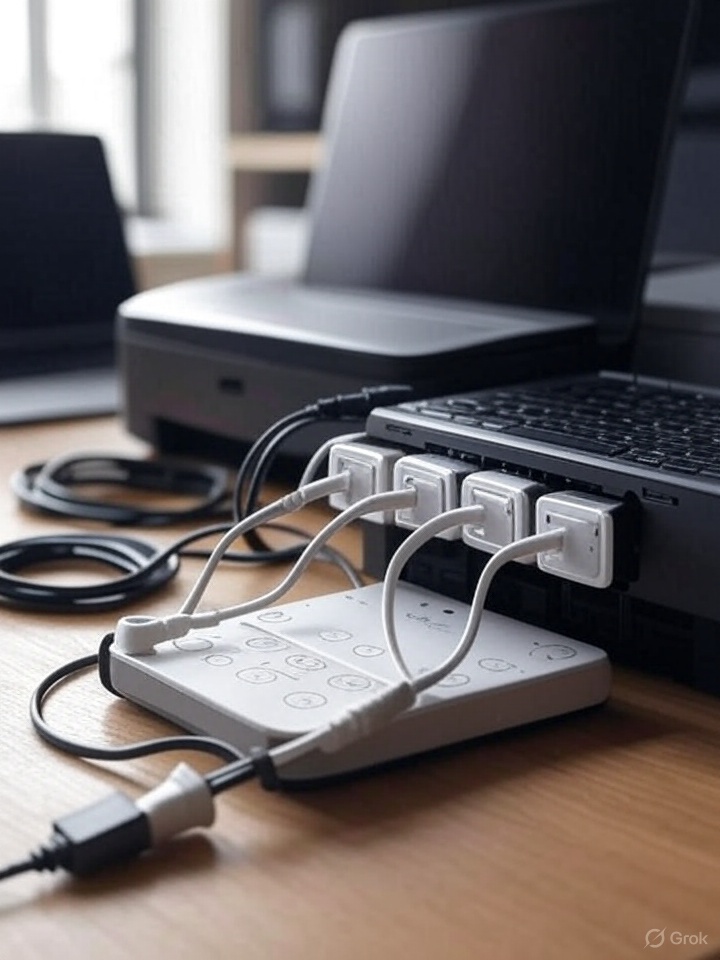
Can I Plug an Extension Cord Into a Surge Protector?
Many people wonder if it’s safe to plug extension cords into surge protectors. While it may seem convenient, there are important safety, performance, and code considerations to keep in mind. Here’s what you need to know before you do it—and what you should use instead.
If you click on links we provide, we may receive compensation.
When it comes to powering our homes and offices, the tangle of cords, chargers, and devices is hard to avoid. That’s why questions about surge protectors and extension cords come up often. One of the most common is: “Can I plug an extension cord into a surge protector?”
I’ve received this question countless times, and while the answer seems straightforward, it comes with nuance. Let’s break it down in a clear Q&A format.
Q: Is it safe to plug an extension cord into a surge protector?
A: Technically, yes—it can be done. But from an electrical safety standpoint, it’s usually discouraged. Extension cords are designed for temporary use, while surge protectors are designed to safeguard sensitive electronics from power spikes. When you combine the two, you risk overheating, tripping circuit breakers, or even creating a fire hazard.
The National Electrical Code (NEC) and organizations like OSHA strongly advise against “daisy chaining” cords (plugging one into another). So while you may see it work, it isn’t best practice.
Q: Why is plugging an extension cord into a surge protector risky?
A: There are three main reasons:
-
Overloading the circuit – Surge protectors have limits on how much current they can handle. Adding an extension cord encourages plugging in more devices, which can exceed that limit.
-
Voltage drop and heat buildup – Extension cords add resistance to the electrical line. The longer and thinner the cord, the more it heats up under load, increasing the risk of failure.
-
Reduced surge protection – Surge protectors are designed to absorb and redirect energy spikes. Using an extension cord can degrade this ability and make protection less reliable.
Q: Does it void the warranty on my surge protector or electronics?
A: In many cases, yes. If you read the fine print on surge protectors, many manufacturers specifically prohibit daisy chaining with extension cords or other surge protectors. If you suffer equipment damage while using them improperly, your claim could be denied.
Q: What about plugging a surge protector into an extension cord?
A: This is even worse. Extension cords are not designed to carry the consistent load that surge protectors and multiple electronics require. Doing this puts stress on the cord, increases the risk of overheating, and creates a serious fire hazard.
Q: Are there any safe scenarios where I can plug an extension cord into a surge protector?
A: If absolutely necessary—for example, when you need a short cord for a temporary setup—you should follow these rules:
- Use a heavy-duty, grounded extension cord (14-gauge or thicker).
- Limit it to low-power devices like lamps or chargers.
- Never use it for heaters, microwaves, or other high-draw appliances.
- Inspect cords regularly for wear or heat.
But again, this should be temporary, not a permanent setup.
Q: What should I do instead of plugging an extension cord into a surge protector?
A: The safer solution is to use an electrical outlet extender or a power strip with a longer built-in cord. These devices are specifically designed to extend your outlets without compromising safety.
They provide multiple outlets, often with surge protection built in, and comply with safety standards. Many also come with smart designs that fit behind furniture or mount neatly to walls.
Q: So what’s the bottom line?
A: While you can technically plug an extension cord into a surge protector, you really shouldn’t. It’s a short-term workaround that introduces risks of overheating, electrical overload, and even voided warranties. For a long-term, safe, and efficient solution, you’re better off with an outlet extender or a properly sized surge protector with a long cord.
And if you’re looking for a simple upgrade that eliminates the hassle, instead of plugging an extension cord into surge protector, get an Electrical Outlet Extender. I got mine here https://amzn.to/3JRRZwT.